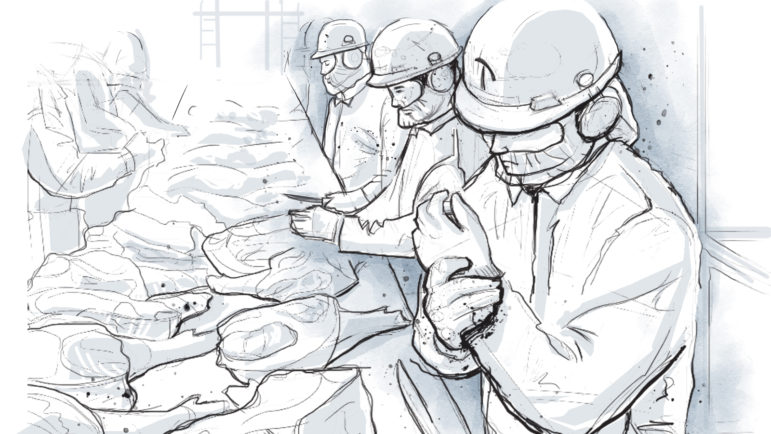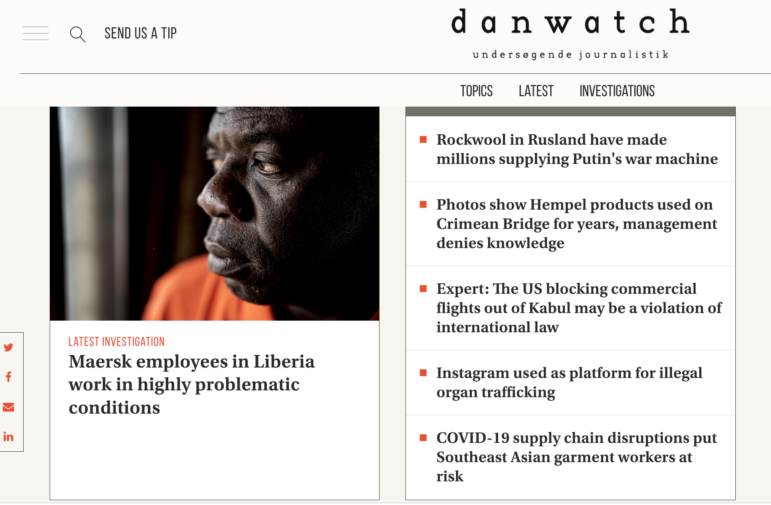

The Nonprofit News Site Taking on Agribusiness in the US Heartland

Although agriculture and agri-business are key to the Midwestern economy, the subjects receive little scrutiny outside daily business stories and trade magazines. Illustration: Courtesy USA Today
When Sky Chadde began tracking the impact of the coronavirus pandemic on the US meatpacking industry in the spring of 2020, he didn’t imagine that a year later he would still be updating a nationwide dashboard.
But soon after he started to investigate how the virus was affecting the region, Chadde realized an inadequate response by authorities in the US was allowing the virus to wreak havoc on the entire meatpacking workforce — and that data about the number of cases and deaths in plants around the country was nowhere to be found.
“That information just wasn’t there. We were trying to fill that need,” said Chadde, managing editor of the Midwest Center for Investigative Reporting, a small, independent, nonprofit newsroom with a special focus on in-depth reporting of agricultural issues in the US Midwestern region.
By painstakingly extracting data from news articles, press releases, and state and federal records, Chadde has now identified more than 49,000 reported positive cases tied to meat and poultry processing facilities. These facilities are particularly susceptible to serious outbreaks, which have claimed the lives of at least 248 workers in 38 states, according to the Midwest Center’s database. Though the numbers alone are striking, the organization knew that data couldn’t tell the whole story. So, last summer, its team decided to dive deeper.
The reporters wanted to zero in on a specific facility and find out how the virus spread through its workforce and the local community. The nonprofit had previously established a relationship with USA Today, which has been funding a fellowship position at its newsroom since 2019; before becoming managing editor, Chadde had been the first fellow. His role was crucial to the decision to work together on a five-month-long investigation into the events that caused a major outbreak at the Triumph Foods plant in St. Joseph, Missouri.
Chadde led the project, along with USA Today reporters Rachel Axon and Kyle Bagenstose. Together, they interviewed more than a dozen current and former workers, and inspected thousands of pages of government records. Chadde also took an on-the-ground trip to St. Joseph, Missouri, with expenses partly offset by a grant from the Pulitzer Center for Crisis Reporting. In the end, the team’s investigation reported that Triumph Foods allegedly failed to put in place measures necessary to prevent the spread of COVID-19 and kept sick workers in the plant for days while they awaited test results. Four of them died.
In a statement to the Midwest Center and USA Today from early October, a spokesman for Triumph said that the company was “proactive” in protecting workers and that it’s response was “swift, well documented, covered in the media, and used as industry guidance for effective best practices nationwide.”
The investigation highlighted one of the ways in which meatpacking companies operated throughout the pandemic, and the risks posed to worker safety. But it also serves as an excellent example of the Midwest Center’s mission to provide comprehensive coverage of agribusiness through in-depth research, data analysis, and collaboration with other news outlets. Ten years after its launch, this model has transformed the nonprofit into a rare and reliable source of watchdog reporting on an industry mostly absent from national news coverage.
Breaking New Ground
The Midwest Center, initially called the Missouri Center for Investigative Reporting, was founded in 2009 by local journalist Mike Sherry and awarded a nonprofit status a year later. It started out as “a one-man shop” in Kansas City, as Sherry acknowledged for a piece in Columbia Journalism Review. His initiative, however, eventually grew in an attempt to also cover stories in the other 11 Midwestern states which sweep from North Dakota to Kansas, Nebraska to Ohio.
Agriculture was not his main focus, but because the Midwest has over 127 million acres of agricultural land, most of which are used to grow corn and soybeans, Sherry knew that farming has always been crucial to this region. Companies invest billions of dollars in agricultural production, yet local communities lacked consistent, critical coverage of the industry. The Midwest Center was about to fill a vital niche, but it was not going to happen quickly.
Pamela Dempsey, now executive director of the Midwest Center, joined the organization a couple of years later. By that time, it had relocated 400 miles east to Champaign, Illinois, and focused its investigative efforts primarily on agribusiness under the leadership of Prof. Brant Houston, Knight Chair in Investigative and Enterprise Reporting at the University of Illinois (and co-founder of the Global Investigative Journalism Network). The Midwest Center’s team was small and had limited funding, a persistent problem for newsrooms of its kind in the US and around the world. But there was another crucial and unique challenge — connecting with the rural communities and developing sources among farmers who seemed inherently wary of media outlets.
“We spent probably five years establishing ourselves as credible, trustworthy reporters, using data and documents to cover this topic in a critical way that also educates the public about things, and then building up some trust within the farming community,” says Dempsey, who admits that making a mark in the agriculture industry has been a challenge for the Midwest Center.
A decade later, the organization’s main team remains small, with only four full-time employees. But freelancers, collaborations with other news organizations, and the partnership with USA Today have enabled the center to expand its activity without betraying its core principles.
“There aren’t a lot of news organizations devoted to covering agriculture the way that we cover agriculture,” notes Chadde, who adds that watchdog reporting of this industry is both expensive and complicated, which turns off most newsrooms. “What really differentiates us is that we try to take an investigative eye to our food system and the major players within it.”
Along with its focus on agriculture, the Midwest Center has earned attention on related issues. In early March, an investigation by reporter Johnathan Hettinger co-published with USA Today revealed that a popular US flea and tick collar — infused with a pesticide — was linked to almost 1,700 pet deaths, tens of thousands of injured animals, and injuries among hundreds of owners. The story went viral, drawing millions of views on the USA Today platform, and has led to a Congressional hearing, a recall request, and a review by the US Environmental Protection Agency.
Dempsey and her colleagues also worked with the Pulitzer Center on a multi-state look at civil asset forfeiture in rural areas. And in another project, the nonprofit obtained records through Freedom of Information Act requests in order to build a database of state inspection reports of migrant worker housing. These publications illustrate the center’s desire to use data in order to investigate problems that other outlets rarely cover.
“We are really good at data analysis. That’s the thing we can bring to the table and help contribute in some way to different stories,” Dempsey explains. “I think that we have really brought attention to issues that would have gone otherwise unreported.”
A Modest but Important Expansion
Reporter Madison McVan earned her degree from the University of Missouri last spring, but finding a meaningful job in the news media during a pandemic, even after graduating from one of the top US journalism schools, wasn’t easy.
During the summer, McVan covered the health crisis’ impact on smaller communities as part of a Missouri pop-up newsroom. Once her fellowship was over, she wanted to continue doing in-depth storytelling rather than covering daily news, but soon realized that opportunities for work in investigative journalism were scarce.
She was considering a different career path when the Midwest Center chose her to be its first, full-time staff reporter.

Members of the Midwest Center’s team, including managing editor Sky Chadde (far left) and executive director Pamela Dempsey (third from right), at a 2019 conference at the University of Illinois. Image: Darrell Hoemann, Midwest CIR
“I didn’t even know that jobs like this still existed. I never once thought I would get to do this, let alone my first year after college,” says McVan, who joined the Center in January. “Not only is the work itself a lot more satisfying when I’m doing investigations full-time, but I also feel super supported in the workplace.”
She has already published pieces on a coronavirus outbreak at a meatpacking plant in northern Illinois and the lack of information on concentrated animal feeding operations. McVan also produced a graphic highlighting E. coli outbreaks linked to romaine lettuce.
The expansion of the Midwest Center’s newsroom may be modest compared to larger news organizations, but the team sees hiring a full-time reporter as a major step forward to advancing its mission. The outlet has managed to retain its core funders throughout the years and attract some new investments.
According to Dempsey, up until 2020, the center’s annual budget was around $250,000, which will now increase to $400,000. Most of the center’s funding comes from foundations like the Reva and David Logan Foundation, which are listed on its website. The rest is split between earned revenue and individual donations, which normally don’t exceed $20,000. A third of that is given by local donors, but the nonprofit also receives generous support from across the country.
“I believe we have attracted funding based on the work that we’re doing,” says Dempsey. “We got a random $5,000 check from a couple we had never met in Washington, D.C., because they appreciated the meatpacking [coverage].”
Dempsey admits that she would like to hire more staff members, but also doesn’t want the Midwest Center to become “too big for our britches.” Ever since its early days, the nonprofit has never aimed at covering every single important event in the Midwestern region. The newsroom prefers to concentrate on a few issues at a time and maximize its efforts to present them in a comprehensive manner.
This approach has earned the group special recognition. In 2018, it won the Peter Lisagor Award for reporting on migrant labor abuses. But for Dempsey, the team’s biggest achievement has been continuing to produce impactful reporting, despite the serious challenges faced by local and national media outlets.
“We’re still here. We haven’t closed up shop,” she notes. “We’re honing our skills every single year. We’re improving and growing as reporters and as a newsroom into this field. We’re still kicking. We’re still working on this. And I think we’re doing it better every time.”
Additional Reading
GIJN Resource: Resources for Reporting on Food and Agriculture
Sustainability: A Survival Guide for Nonprofit Investigative Groups
You can follow The Midwest Center for Investigative Reporting on Twitter @IMidwest.
 Peter Georgiev is GIJN’s social media and engagement editor. Previously, he was part of NBC News’ investigative unit in New York. He also worked as a correspondent for Bulgarian National Television and his reporting has been published by the Guardian, Deutsche Welle, and other international outlets.
Peter Georgiev is GIJN’s social media and engagement editor. Previously, he was part of NBC News’ investigative unit in New York. He also worked as a correspondent for Bulgarian National Television and his reporting has been published by the Guardian, Deutsche Welle, and other international outlets.











